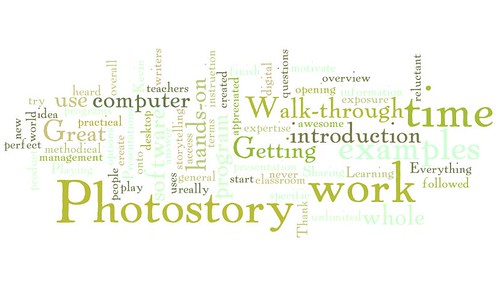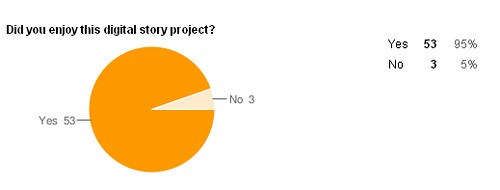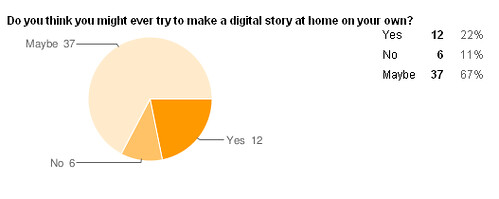The post I would like to share today is about how smoothly everything went with our digital storytelling project (see my first and second posts about the project). I’d like to say how wonderfully productive the day was, and how prepared I was for anything that might happen.
I can’t do that.
There were good things. Just about every single one of my students (that’s about 80) now have their images and narration layered into iMovie for their digital story. They worked hard; they helped each other. I was zooming around the room, offering on-the-spot help and tutorials, asking them to explain what they were doing.
But, the struggle was with going online to use FreeplayMusic to download some soundtrack music. It’s a longer story, but we ran out of IP addresses, and more than two-thirds of the classes were unable to connect, leaving their digital stories without music. And here, I did this whole lesson around choosing a piece of music that is emotionally connected to the tone of your digital story. Lack of music is now a huge gap in their stories.
And, I was frustrated because I had no back-up plan. I didn’t have time to download a bunch of songs onto a flash drive, and I wouldn’t have had time to run around dumping the folder onto laptops. And it would have gone against the grain of what I had told them — the choosing of their music is personal and emotional, etc. I was flustered and for kids who were done and left with little to do, I had then play around with ComicLife and PhotoBooth. I had no plan for them, and I was still working with others on their digital stories (I did recruit some helpers.)
Our tech person was able to show me how to delete old IP addresses from the server (and a fix is coming, with an upgrade to our network in April), and I thought that would be fine for my last class. But we ran into the same problems, until the very end of the class, when a student suggested we just click on the wireless icon and reset the connection. Doh. That worked, but it was too late. Class was over.
I had hoped to be done, but it seems like I need another class period to get this last step completed. I am proud of the work they are doing and I am amazed at how resilient they were in the face of difficulties. They were frustrated, but they shrugged it off – quicker than I could. I guess technology fails regularly enough in their lives that they accept it as a possibility.
Which isn’t to say that there weren’t digital stories created. Some of the kids who were on the Internet were able to complete their projects. A sampler of some of them is at the top of this post.
Peace (in the digital age),
Kevin




